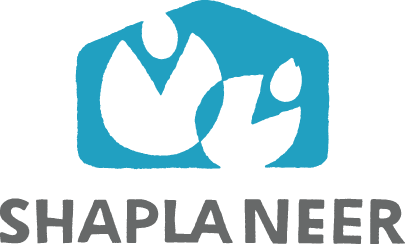
Though it is a sandbank, the size is like an isolated island, where opportunity for education is limited and other support, hard to reach. At one char, in two villages, 8 Child Education Programs (CEP) are being operated for children coming from particularly poor families.
However, even now, the rate of children not going to school and the drop out rate are high. We are holding workshops (forum for discussion) for parents and local community people more regularly, and to improve the number of school aged children attending school.
All children living on the sandbank continuously receive public education.
About 20% of children (ages 7-10) who we work with in the char area do not attend school, and those who do, about 10% drop out for various reason.
The reason for this is the School Management Committee (similar to Japan’s education board and PTA combined) does not function well, and the interest in children’s education is low.
How do we achieve our mission?
Support for the children
Eight Child Education Program (CEP) centers are being operated so children can smoothly go back into school, and to stay in school.
Besides the textbooks for elementary school, such things as notebooks and pens, blackboards, rulers, and other supplies necessary for education and classroom management are provided.
Also, we research households that have children reaching school-age, and grasp their situation.
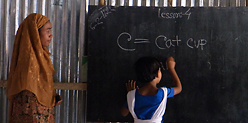
Support for teachers
We visit the public schools weekly, and with the teachers, share information about how physically weak students are doing, about attendance of children going to CEP centers, about grades, and try to prevent children from dropping out of school.
Also, we will continue training for teachers for our CEP centers.
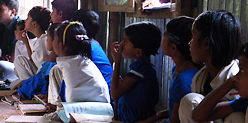
Support for parents
We hold meetings with parents, and talk about the importance of education, encouraging them to keep their children in school.
We connect the people in School Management Committee, school related personnel, and other related offices, and communicate ways to contact each other.
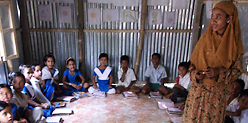
Working with government and local community
Besides parents, we urge professionals and other private citizens who have influence in elementary school management to organize a Community Education Promotion Committee.
Along with support for the School Management Committee, we try to affect the local community’s awareness about school education.
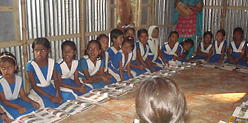
Our Partner Organization
| Name of the organization | Poverty Alleviation through Participatory Rural Initiatives |
|---|---|
| Region | 2 unions in Raipura Upazila in Narsingdi District |
| Annual budget / Number of staffs | about 2,150,000yen / 3.5 |
| Beneficiaries | 300 (1500, including indirect ones) |
| Summary of the organization | PAPRI is a local NGO which became independent of Shapla Neer in 1999. Its base of the operations is located in Narsingdi District, which is to the northeast of Dhaka and whose population is about 1.9 million. As a middle-scale NGO, PAPRI is working on farm development in various ways such as micro credit and sanitation. The number of staff is 361, and the annual budget is around 41million yen, including that of Shapla Neer. Although Shapla Neer was the only partner at first, today PAPRI is associated with large international organizations such as UNDP and UNICEF, after raising its estimation as a NGO. |
